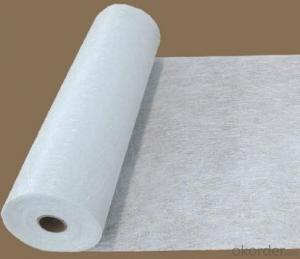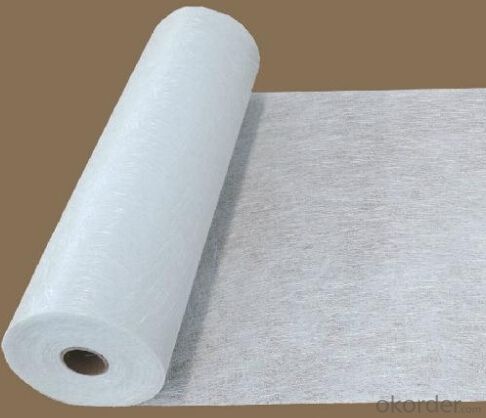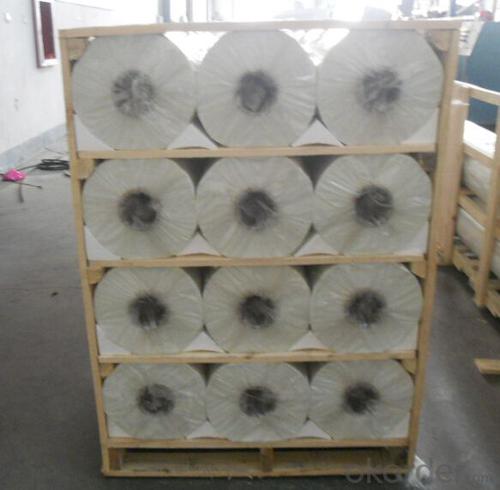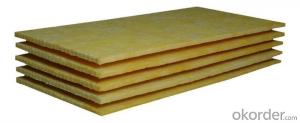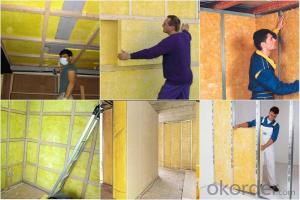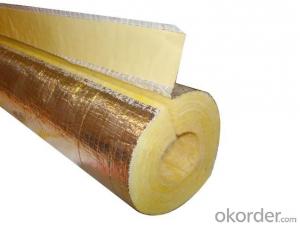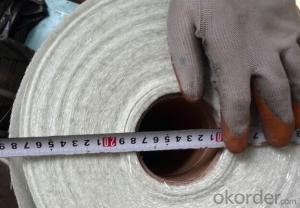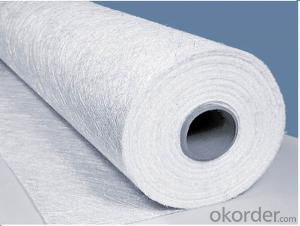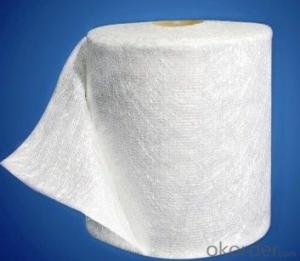Fiberglass Mat Tissue E-Glass Fiber Chopped Strand Mat for FRP Tank
- Loading Port:
- Shanghai
- Payment Terms:
- TT OR LC
- Min Order Qty:
- 4000 kg
- Supply Capability:
- 200000 kg/month
OKorder Service Pledge
OKorder Financial Service
You Might Also Like
Introduction of E-glass Chopped Strand Mat
Chopped strand mat is made from fiberglass chopped strands boned with powder binder or emulsion binder.
This products ischaracterized bg good combination of resin,easg operation ,good wet strengthretention,good laminate transparency
Chopped strand mat is used primarily for hand lay-up processes, filament winding and press molding of FRP products. Typical products include bathroom
accessories, pipe, building materials, automobiles, furniture and other FRP products.
Features of E-glass Chopped Strand Mat
1.Warp and weft rovings aligned in a parallel,flat manner and uniform tension .
2.Densely alighed fibers,providing high dimensional stability ans easy handing .
3.Good moldability,fast and complete resin wet-out ,enabling high productively .
4.Good transporsision and hign strength of the composite products.
5.Even thickness ,no fuzz ,no stain.
6.Fast wet-out ,products with high strength ,little loss for strength in damp situation.
Features of E-glass Chopped Strand Mat
1.the composit products have high dry and wet tensile strenth and good transparency.
2.Low fuzz ,dirt ,impurity and other stain
Images of E-glass Chopped Strand Mat
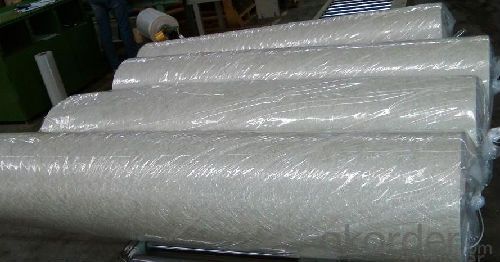
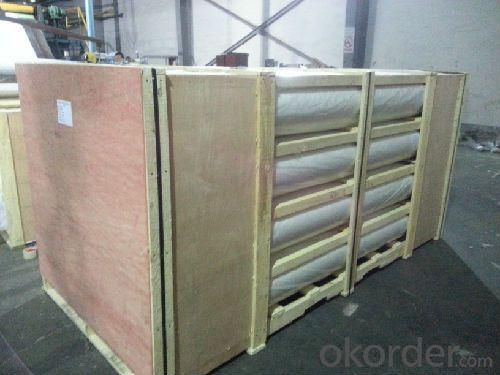
E-Glass Chopped Strand Mat Specification:
Property | Glass type | Weight(g/m2) | Width 200~3300 | Roll Weight | Moisture Content /% | Combustible Content /% | Breakage Strength /N |
Test Method | GB/T 1549 | ISO3374:2000 | ISO3374 | GB/T17470-1998 | ISO3344:1997 | ISO1887:1995 | ISO3342 |
EMC 80 | E-GLASS | 80±16 | ±5 | 6~50 | <0.2< span=""> | 13.6±0.35 | ≥200 |
EMC 100 | E-GLASS | 100±10 | ±5 | 6~65 | <0.2< span=""> | 9.5±0.35 | ≥170 |
EMC 150 | E-GLASS | 150±15 | ±5 | 6~97 | <0.2< span=""> | 8.0±0.35 | ≥40 |
EMC 225 | E-GLASS | 225±22 | ±5 | 6~150 | <0.2< span=""> | 5.0±0.6 | ≥60 |
EMC 300 | E-GLASS | 300±30 | ±5 | 6~180 | <0.2< span=""> | 4.0±0.6 | ≥90 |
EMC 450 | E-GLASS | 450±45 | ±5 | 6~180 | <0.2< span=""> | 3.8±0.6 | ≥120 |
EMC 600 | E-GLASS | 600±60 | ±5 | 6~240 | <0.2< span=""> | 3.6±0.6 | ≥150 |
EMC 900 | E-GLASS | 900±90 | ±5 | 6~190 | <0.2< span=""> | 3.4±0.6 | ≥180 |
FAQ of Chopped strand mat
1. Why Choose us?
CNBM is a stated own company, provide the guarantee for the best quality, best service and safety business.
2. How will we guarantee the quality?
a, ISO 9001-2008 quality control system;
b, Strict and regular quality control in production;
c, Inspeciation when loading into container before shippment;
d, Sample stock for one year for quality tracing and record.
3. What is your MOQ?
Our MOQ is one pallet.
4. Can you provide sample?
Yes, samples are in stock. we can offer free sample for you.
5. Payment terms?
We can accept L/C, T/T etc.
6. Do you offer OEM service?
Yes, we can print customers’ logo on the packaging;
And the size and specification can be produced and design according to your demand.
- Q: What is the maximum temperature fiberglass mat tissue can withstand?
- The maximum temperature that fiberglass mat tissue can withstand depends on various factors such as the specific type of fiberglass used, the thickness of the tissue, and the manufacturing process. Generally, fiberglass mat tissue can withstand temperatures up to 1000°F (538°C) without significant degradation or loss of mechanical properties. However, it is important to note that prolonged exposure to high temperatures can still cause some deterioration in the material's performance. For applications requiring higher temperature resistance, specialized fiberglass materials with enhanced heat resistance can be used. It is recommended to consult the manufacturer or supplier for specific temperature ratings and guidelines for the particular fiberglass mat tissue being used.
- Q: Can fiberglass mat tissue be used as a reinforcement in concrete?
- Yes, fiberglass mat tissue can be used as a reinforcement in concrete. Fiberglass mat tissue is a thin, lightweight material made from woven fiberglass strands. It is commonly used in construction and industrial applications due to its high strength and durability. When used as reinforcement in concrete, fiberglass mat tissue can help to increase the tensile strength and crack resistance of the concrete. It is typically applied in the form of a mesh or fabric, which is embedded within the concrete during the pouring process. The fiberglass strands in the mat tissue provide additional strength and reinforcement to the concrete, helping to prevent cracking and improve overall structural integrity. This can be particularly beneficial in areas where the concrete is subject to high loads, such as in bridges, concrete slabs, or precast concrete elements. Furthermore, fiberglass mat tissue is corrosion-resistant, which makes it a suitable choice for applications where the concrete is exposed to moisture or chemicals. It does not rust or degrade over time, unlike traditional steel reinforcement, which can help to extend the lifespan of the concrete structure. Overall, fiberglass mat tissue is a viable and effective reinforcement option for concrete. It offers enhanced strength, crack resistance, and corrosion resistance, making it a popular choice in various construction projects.
- Q: What is the cost of fiberglass mat tissue?
- The cost of fiberglass mat tissue can vary depending on factors such as the thickness, size, and brand. It is best to check with suppliers or retailers for specific pricing information.
- Q: What is the expected lifespan of fiberglass mat tissue?
- The expected lifespan of fiberglass mat tissue can vary depending on several factors such as the quality of the material, the conditions it is exposed to, and the specific application it is used for. However, on average, fiberglass mat tissue is known for its durability and long lifespan. When properly manufactured and installed, fiberglass mat tissue can last for several decades. It is resistant to rot, corrosion, and many chemicals, making it suitable for various industries and applications. Additionally, fiberglass mat tissue is known for its strength and ability to withstand high temperatures. However, it is important to note that exposure to harsh environmental conditions, such as extreme temperatures, UV radiation, and moisture, can potentially degrade the material over time. Regular maintenance and proper care can help extend the lifespan of fiberglass mat tissue. Overall, while it is challenging to determine an exact expected lifespan for fiberglass mat tissue, it is generally considered to be a long-lasting material when used and maintained correctly.
- Q: Is fiberglass mat tissue resistant to moisture vapor transmission?
- Yes, fiberglass mat tissue is resistant to moisture vapor transmission. It is a highly durable and moisture-resistant material that is commonly used in various applications where moisture control is important, such as in roofing, insulation, and flooring. The fiberglass mat tissue is specifically designed to prevent the transmission of moisture vapor, helping to maintain the integrity and performance of the materials it is used with. Its resistance to moisture vapor transmission makes it an ideal choice for environments where moisture control is critical.
- Q: Can fiberglass mat tissue be used for flooring applications?
- For flooring applications, fiberglass mat tissue is a viable option. Composed of glass fibers, this thin, non-woven fabric offers a lightweight and flexible solution. Its exceptional strength and durability further contribute to its suitability for diverse flooring uses. To reinforce flooring systems like vinyl or linoleum, fiberglass mat tissue can serve as a layer of support. By preventing cracking or warping, it adds strength and stability. Typically, the mat tissue is embedded in adhesive or resin, establishing a robust bond between the flooring material and the subfloor. Furthermore, fiberglass mat tissue can function as an underlayment during flooring installations. It acts as a barrier between the subfloor and the flooring material, providing insulation, soundproofing, and moisture resistance. This protective measure safeguards against moisture damage, reduces noise transmission, and maintains a comfortable indoor environment. In summary, fiberglass mat tissue is a versatile material that enhances flooring applications. Its strength, flexibility, and moisture resistance make it suitable for various flooring systems, offering improved stability, durability, and comfort.
- Q: What are the different thickness tolerances for fiberglass mat tissue?
- The thickness tolerances for fiberglass mat tissue can differ depending on the manufacturer and product specifications. Generally, fiberglass mat tissue is offered in a range of thickness tolerances from 0.5 millimeters (mm) to 3 mm. The tolerance represents the acceptable range of thickness variation within a product. For instance, a fiberglass mat tissue with a thickness tolerance of +/- 0.5 mm means that the actual thickness can deviate by up to 0.5 mm in either direction from the specified thickness. The required tolerance for a specific application depends on the intended use and desired precision. Thicker fiberglass mat tissues with smaller tolerances are commonly utilized in applications that demand greater strength and durability, like reinforcing concrete in the construction industry or manufacturing composite materials. Conversely, thinner fiberglass mat tissues with larger tolerances may be employed in applications where flexibility and conformability take precedence, such as insulation or soundproofing in the automotive industry. To obtain accurate information regarding available thickness tolerances for fiberglass mat tissue, it is crucial to refer to the manufacturer's specifications or contact a supplier. These tolerances can significantly vary based on the specific product and supplier.
- Q: Does fiberglass mat tissue require any special precautions during cutting?
- Special precautions are necessary when cutting fiberglass mat tissue. Made up of delicate glass strands, inhaling or touching it can be dangerous. To reduce risks, certain measures should be taken. Firstly, it is important to wear appropriate personal protective equipment (PPE) like gloves, safety glasses, and a dust mask or respirator. These will safeguard your skin, eyes, and respiratory system from harm. Secondly, tools specifically designed for cutting fiberglass, such as a serrated-edge utility knife or scissors, should be used. These tools minimize the release of loose fibers and reduce the risk of injury. Moreover, working in a well-ventilated area or using proper dust extraction systems is crucial to prevent the release of fiberglass particles into the air. This minimizes the risk of inhaling fibers and developing respiratory issues. Lastly, handling cut fiberglass mat tissue with care is essential to avoid accidental contact with bare skin. If contact occurs, washing the affected area immediately with soap and water is recommended. Seeking medical attention may be necessary. By following these precautions, the risks associated with cutting fiberglass mat tissue can be minimized, ensuring a safe working environment.
- Q: What is the flexural strength of fiberglass mat tissue?
- The flexural strength of fiberglass mat tissue refers to its ability to resist bending or flexing without breaking. It is typically high due to the reinforcing properties of the fiberglass material, making it suitable for applications requiring structural integrity and resistance to deformation.
- Q: What is the abrasion resistance of fiberglass mat tissue?
- The abrasion resistance of fiberglass mat tissue is relatively high. Fiberglass mat tissue is made up of fine fibers of glass that are woven or pressed together to form a mat. These fibers are known for their strength and durability, making them resistant to abrasion. This means that the fiberglass mat tissue is less likely to wear, tear, or become damaged when subjected to friction or rubbing against other surfaces. It can withstand the scraping, scratching, or rubbing action without losing its integrity or structural integrity. Therefore, fiberglass mat tissue is often used in applications where abrasion resistance is important, such as in the construction industry for reinforcing concrete or in the manufacturing of composite materials.
Send your message to us
Fiberglass Mat Tissue E-Glass Fiber Chopped Strand Mat for FRP Tank
- Loading Port:
- Shanghai
- Payment Terms:
- TT OR LC
- Min Order Qty:
- 4000 kg
- Supply Capability:
- 200000 kg/month
OKorder Service Pledge
OKorder Financial Service
Similar products
Hot products
Hot Searches
Related keywords
